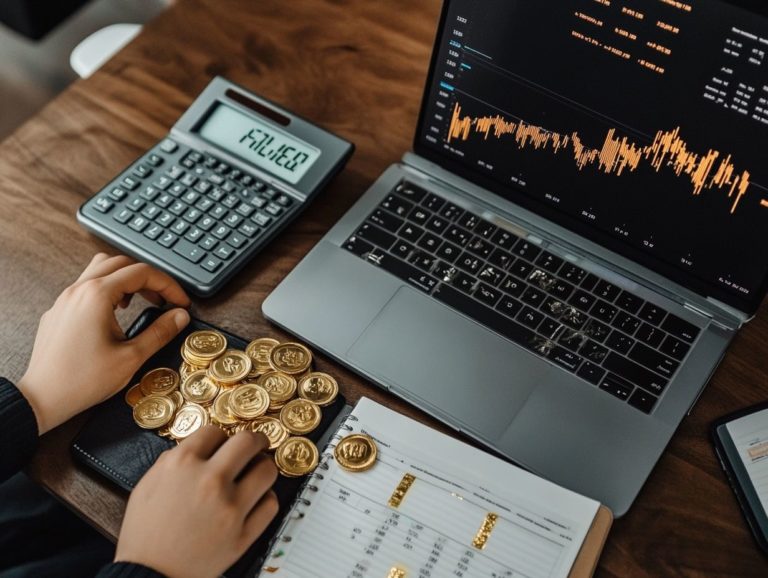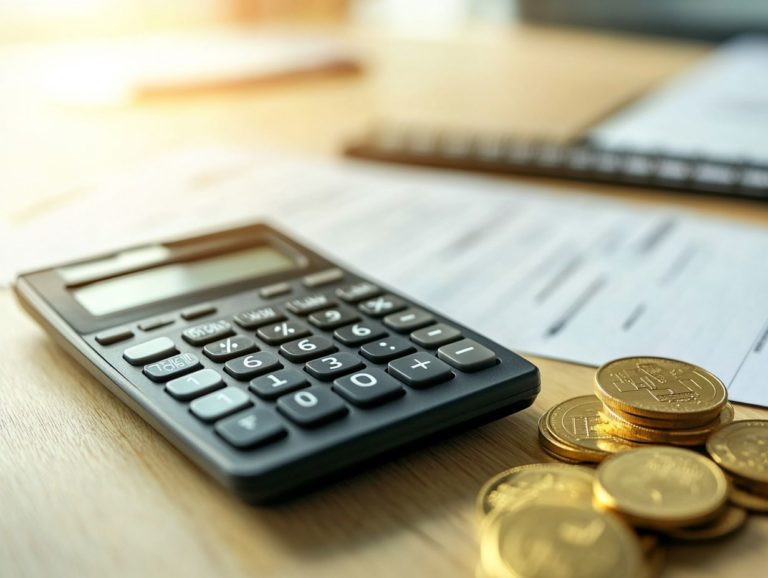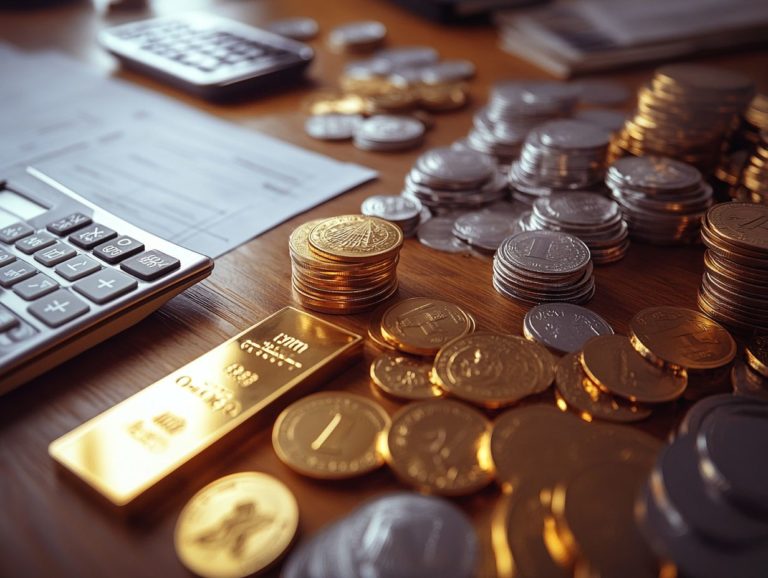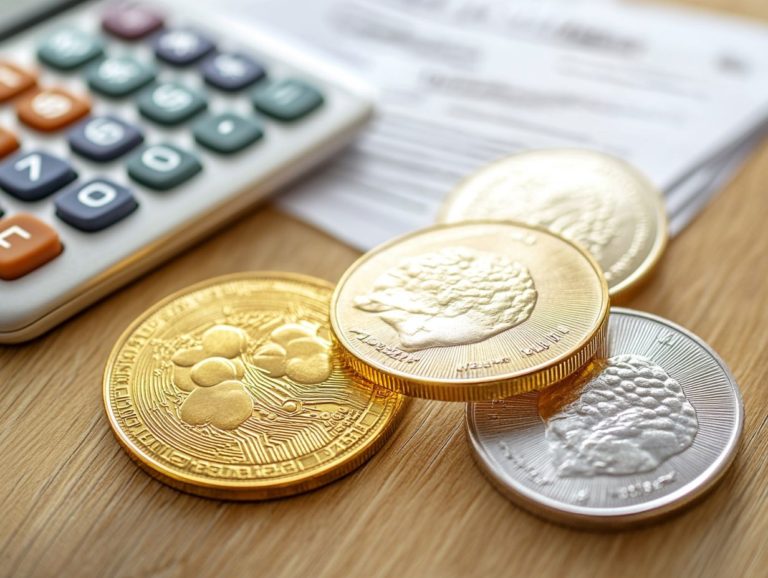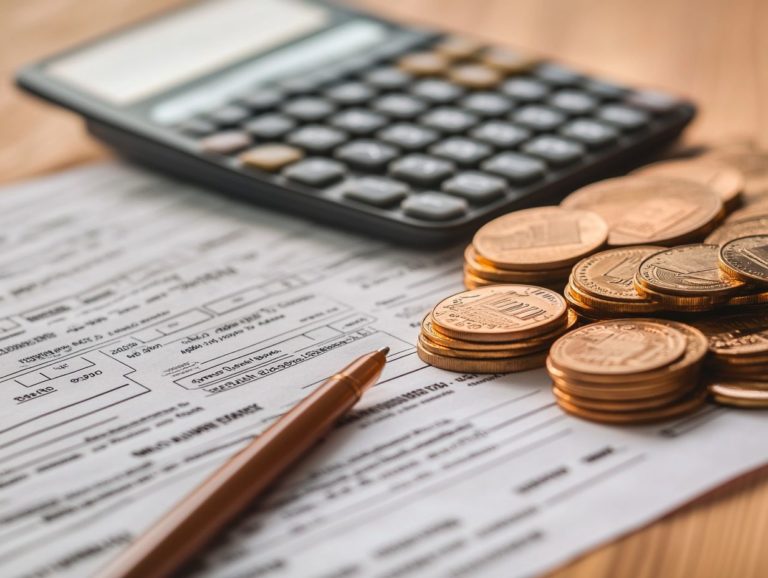Tax Implications of Precious Metals in Business Transactions
In today’s dynamic business landscape, you’re likely aware that precious metals serve not only as valuable investment vehicles but also as essential components in various transactions.
Gaining a solid understanding of the different types of precious metals and their importance in business dealings can significantly enhance your ability to navigate this complex arena. Tax implications tied to their use are also critical to consider.
From sales taxation to reporting requirements and strategies for minimizing tax burdens, this article will offer valuable insights that could directly impact your bottom line.
Explore the intricate relationship between precious metals and business transactions, ensuring you remain well-informed and thoroughly prepared for any potential challenges that may arise.
Contents
- Key Takeaways:
- Understanding Precious Metals in Business Transactions
- Tax Implications of Using Precious Metals
- Reporting Requirements for Precious Metals Transactions
- Strategies for Minimizing Tax Impact
- Frequently Asked Questions
- What are the tax implications of using precious metals in business transactions?
- Are there any tax exemptions for using precious metals in business transactions?
- What is the tax rate for capital gains on precious metals in business transactions?
- Are there any tax deductions for using precious metals in business transactions?
- Do taxes need to be paid when exchanging one type of precious metal for another in a business transaction?
- Are there any special tax considerations for international business transactions involving precious metals?
Key Takeaways:
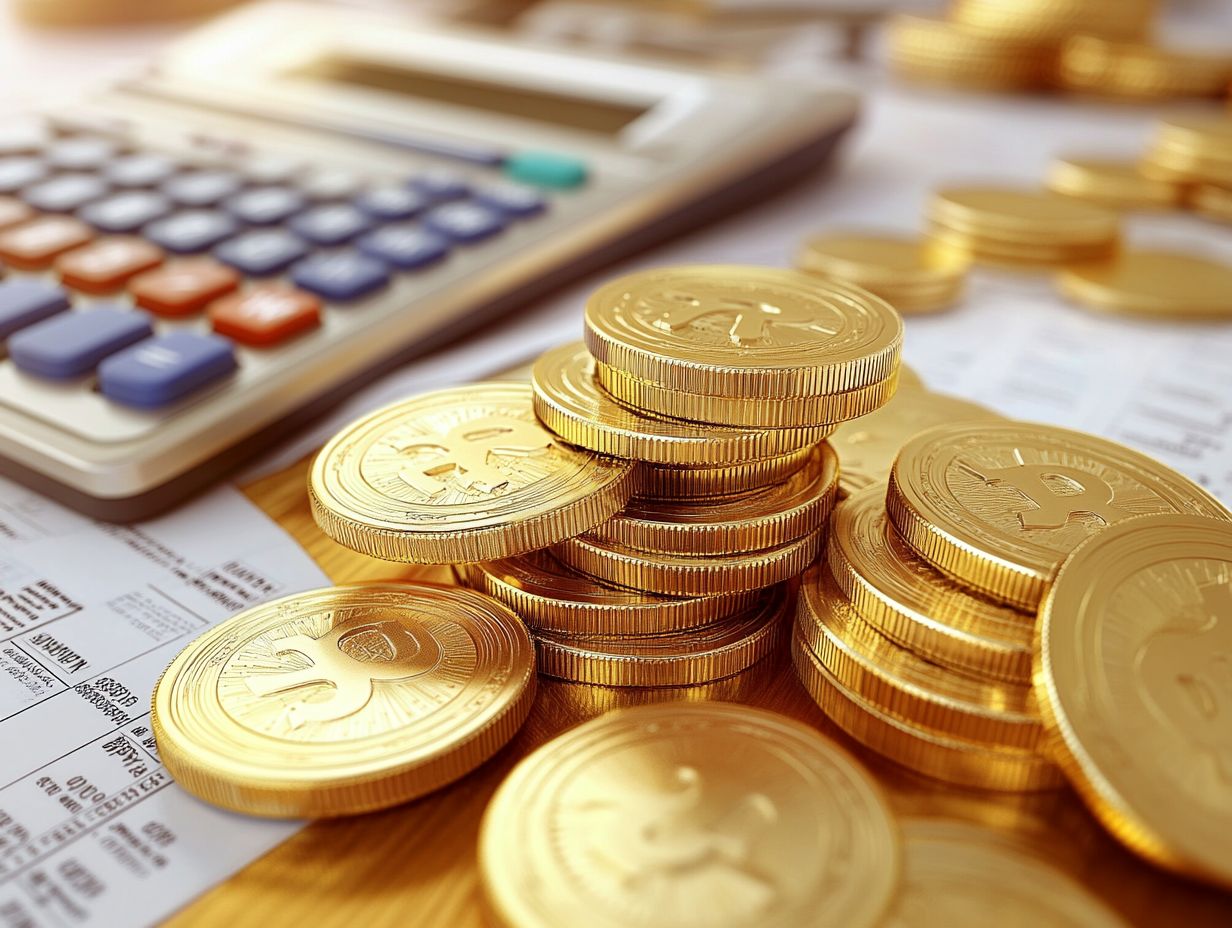
- Precious metals play a significant role in business transactions, with gold, silver, and platinum being the most common.
- Consider tax implications when dealing with precious metals, including sales tax and potential deductions.
- Compliance with IRS guidelines can help minimize tax impacts on your transactions.
Understanding Precious Metals in Business Transactions
Mastering precious metals in your business can give you the edge you need! Understanding precious metals in business transactions is crucial for you as an entrepreneur or investor.
These investment assets gold, silver, and platinum present unique opportunities and challenges that can significantly impact your financial strategy.
During periods of economic uncertainty, precious metals can act as a safeguard against changes in the market. However, they also come with specific tax implications and compliance requirements under IRS regulations, particularly regarding profits from selling an asset for more than you paid for it and reporting obligations.
Grasping these aspects now will empower you to navigate the landscape confidently and seize opportunities.
Types of Precious Metals Used in Business
In your business transactions, you ll find that various precious metals, including gold, silver, and platinum, serve as both investment assets and collectibles. These metals are not just valuable commodities; they act as a hedge against inflation and economic uncertainty.
Gold, often regarded as the ultimate safe haven, boasts liquidity and historical stability, making it a favored choice among individual investors and large institutions alike. Silver, on the other hand, shines with its industrial applications, offering a unique investment opportunity thanks to its dual role in both technology and precious metals markets. Then there s platinum, which is rarer than both gold and silver; it s frequently linked to luxury goods and the automotive industry, adding yet another layer of potential value.
As an investor, you can diversify your portfolio with options like exchange-traded funds (ETFs) and mutual funds, which allow you to gain exposure to these metals without the hassle of physical ownership. This approach facilitates easier trading and enhances liquidity, making your investment journey smoother and more efficient.
Value and Importance in Business Transactions
The value and importance of precious metals in your business transactions stem from their market worth and their role as stable investment assets, especially during times of economic uncertainty.
Metals like gold and silver are not only celebrated for their intrinsic value but also serve as a reliable hedge against inflation. This characteristic allows you to preserve your purchasing power even when costs are on the rise.
By integrating precious metals into your portfolio, you can navigate market volatility with greater ease, thereby ensuring your financial stability.
However, the tax implications tied to buying and selling these assets can be quite intricate, so it s essential for you to grasp how they may impact your overall returns. When utilized wisely, these assets not only elevate your investment portfolio but also act as a robust insurance policy during unpredictable economic climates.
Tax Implications of Using Precious Metals
The tax implications of using precious metals are complex and typically require guidance from financial advisors or tax professionals. Understanding capital gains, income tax, and other relevant reporting obligations set by the IRS can be challenging. Expert advice is invaluable for ensuring compliance and optimizing your financial strategy.
Taxation on the Sale of Precious Metals
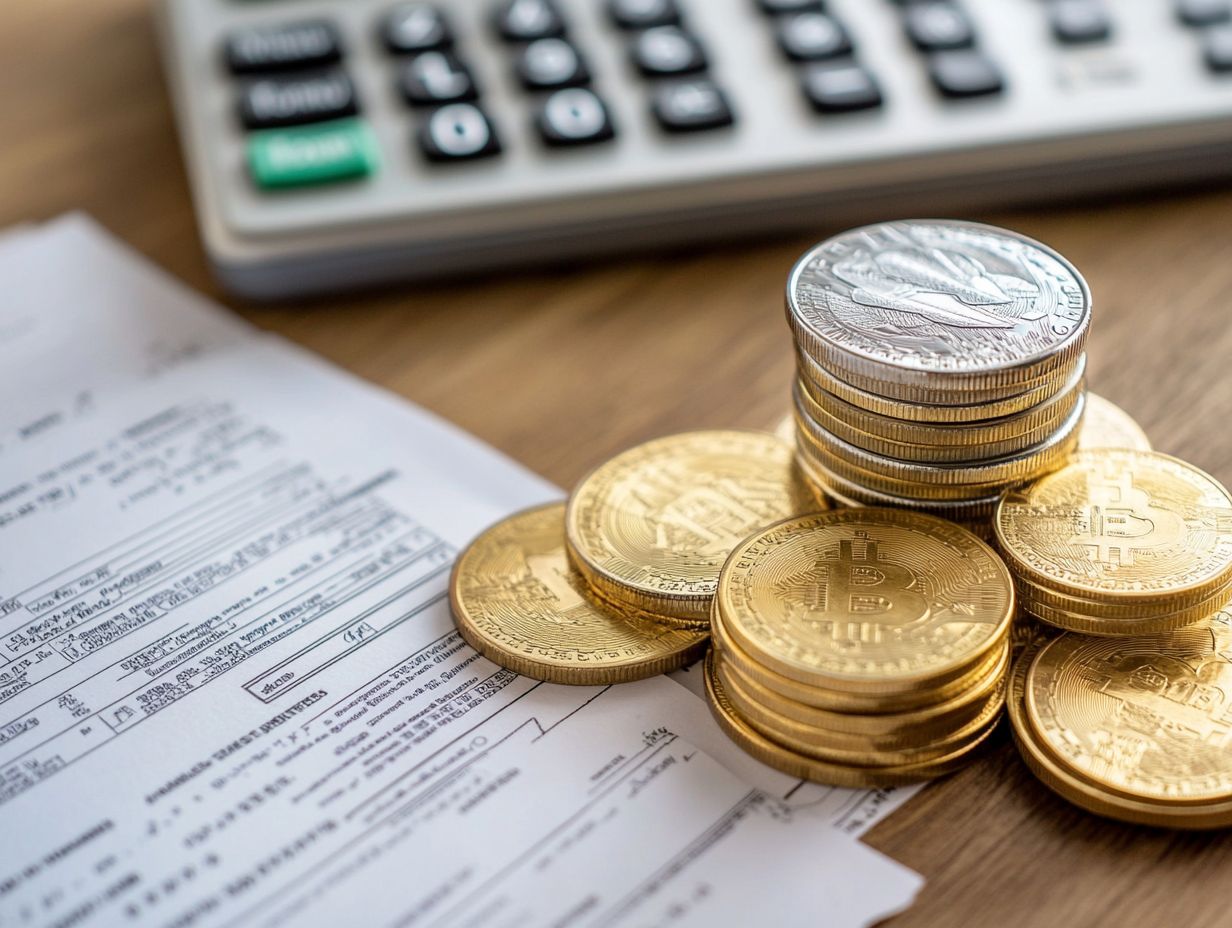
When you sell precious metals, grasping the intricacies of capital gains tax is essential. The IRS makes a clear distinction between long-term and short-term gains, which directly affects your overall tax liability.
You must carefully navigate these distinctions. The holding period of your asset plays a crucial role in how it s taxed. If you ve held an asset for over one year, it qualifies for the more favorable long-term capital gains rates, which are often significantly lower than the short-term gains taxed at ordinary income rates.
Understanding the reporting requirements is also important. You ll need to accurately report any transactions on your tax returns, detailing the purchase and sale prices and the holding period. This ensures compliance with IRS regulations and helps you avoid potential penalties later.
Tax Deductions for Business Expenses
Tax deductions for business expenses related to precious metals can significantly impact your company’s overall tax liabilities. Seeking guidance from tax professionals or financial advisors is crucial for optimizing these deductions.
Expenses like purchasing bullion, refining costs, transportation, and insurance premiums for storing valuable assets may all be deductible. Understanding the tax impact of precious metals can help lower your taxable income, ultimately alleviating your tax burden and enhancing cash flow for the business.
Understanding the intricacies of these deductions is vital. Specific criteria must be met to ensure compliance with tax regulations. Talk to experts now to uncover the best strategies for your financial health while navigating the complexities of taxation concerning precious metals investments!
Reporting Requirements for Precious Metals Transactions
Reporting requirements for precious metals transactions are essential for maintaining compliance with IRS regulations. Accurate reporting on tax returns can safeguard you against potential penalties and foster a transparent financial environment for both investors and businesses.
IRS Reporting Guidelines
The IRS has established specific reporting guidelines for anyone involved in precious metals transactions, emphasizing the critical importance of compliance to avoid penalties.
When you sell or exchange precious metals like gold, silver, platinum, or palladium, you are required to report those transactions using Form 1099-B, especially if they exceed $600. Additionally, it’s important to consider the tax implications of precious metals in business ventures if you’re storing them in a self-directed IRA, and adhere to the stringent reporting requirements detailed in IRS Publication 590.
Neglecting these regulations can lead to significant penalties, including hefty fines and potential legal complications. Thus, a thorough understanding of the rules is essential. By staying informed and diligently following protocols, you can protect yourself from costly consequences.
Don t let confusion about taxes hold you back. Consult with a tax professional today for clarity and peace of mind!
Penalties for Non-Compliance
Non-compliance with IRS regulations concerning precious metals can lead to significant penalties. It s vital for you, as an investor or business owner, to consult with financial advisors to ensure you re on the right side of the law.
Understanding the seriousness of these penalties is key. They can range from substantial fines to potential legal repercussions that could severely impact your financial stability. If you fail to accurately report transactions, you might trigger audits, complicating an already daunting situation.
Therefore, if you re involved in buying or selling precious metals, it’s crucial to prioritize the accuracy of your tax returns.
Seeking professional guidance is important. It can provide you with the clarity you need to navigate the complex landscape of tax obligations. By taking this proactive approach, you not only mitigate risks but also ensure compliance, protecting your assets and securing your future endeavors.
Strategies for Minimizing Tax Impact
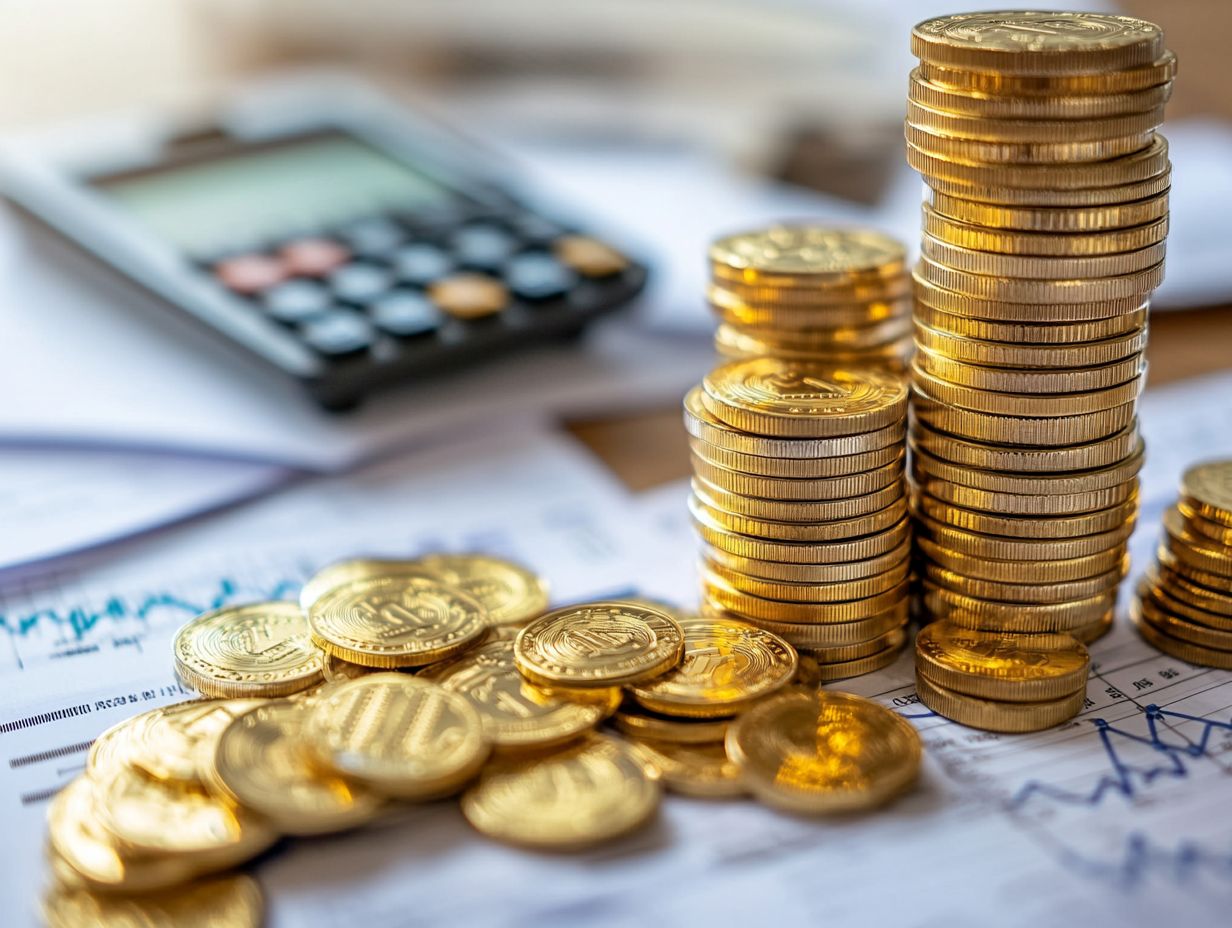
Employing effective strategies to minimize the tax impact from your precious metals transactions is essential. You have various options at your disposal, from planning ahead to utilizing tax-deductible contributions and managing capital losses.
By carefully considering these strategies, you can enhance your investment outcomes and safeguard your financial future.
Maximizing Deductions and Credits
Maximizing your deductions and credits is crucial for minimizing the tax liabilities tied to your precious metals investments. Consulting with financial advisors or tax professionals can greatly assist you in navigating these complexities.
These experts have the expertise to identify qualifying expenses you can deduct, including costs related to storage, insurance, and certain fees associated with buying and selling these assets. They stay updated on current tax laws and regulations, ensuring that you utilize all potential credits applicable to your investments in precious metals.
Engaging professional guidance not only streamlines the process but also significantly enhances your opportunities for financial savings. This provides you with peace of mind and clarity in a field that can often seem overwhelming for the average investor.
Structuring Transactions for Tax Efficiency
Structuring transactions for tax efficiency is essential for you as an investor in precious metals. It ensures that you comply with IRS regulations while also optimizing your financial outcomes.
By leveraging various methods, such as utilizing tax-advantaged accounts like IRAs specifically designed for precious metals, you can effectively minimize your tax burdens. Engaging in strategies that focus on long-term capital appreciation rather than short-term gains positions you to benefit from lower tax rates applicable to assets held for over a year. To further understand the tax effects of precious metals investments, consider exploring additional resources.
Understanding the implications of each transaction and accurately reporting your gains and losses is crucial. You might also want to consider the potential benefits of donating precious metals to charity, which can offer both a philanthropic outlet and valuable tax deductions.
Together, these strategies create a comprehensive approach to financial planning within this unique asset class.
Frequently Asked Questions
What are the tax implications of using precious metals in business transactions?
The tax implications of using precious metals in business transactions vary depending on the specific circumstances. Generally, any gains or losses from buying, selling, or exchanging precious metals are subject to taxes.
Are there any tax exemptions for using precious metals in business transactions?
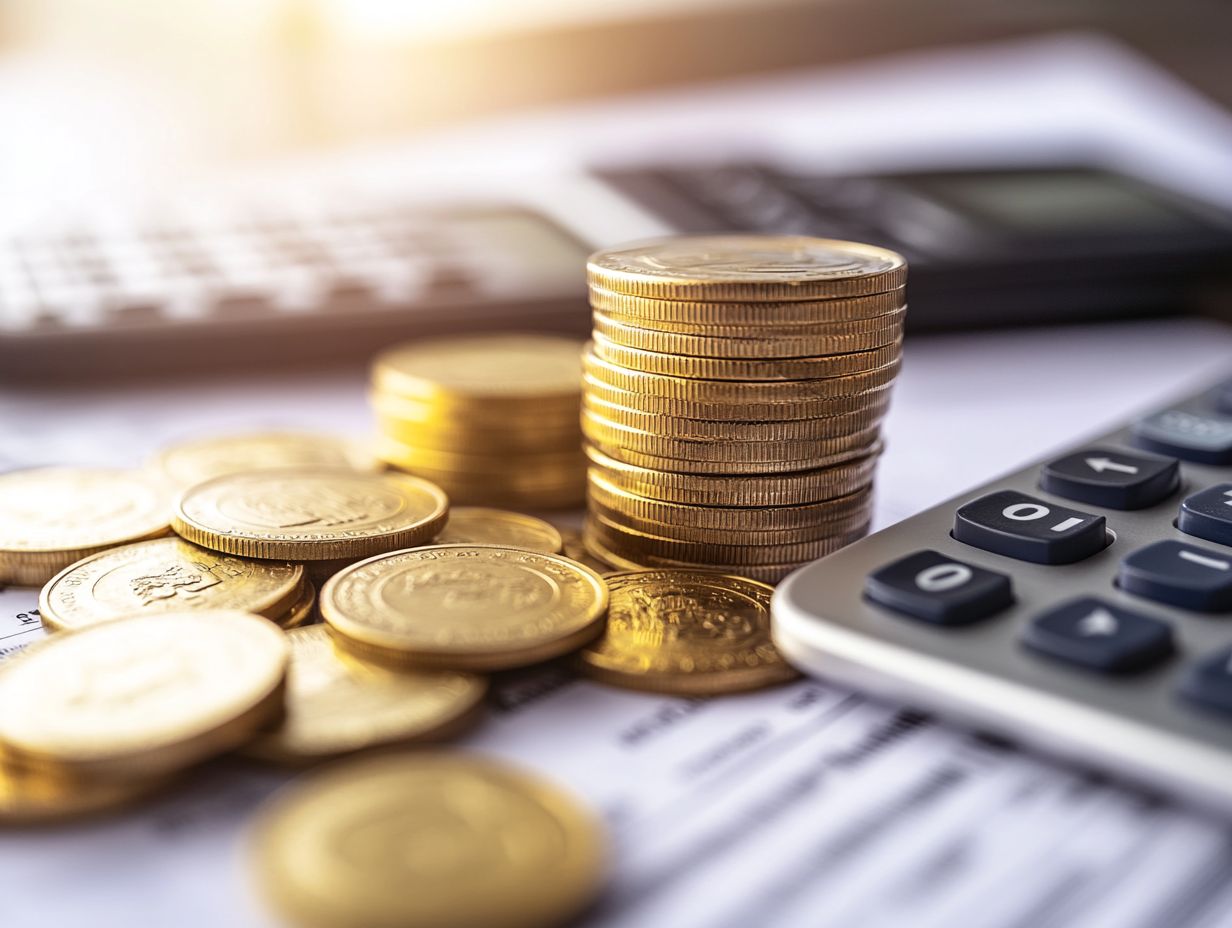
In some cases, certain types of precious metals, such as gold and silver coins, may be exempt from taxes if they are considered legal tender by the government. However, this exemption may not apply to all transactions, and it is important to consult with a tax professional for specific advice.
What is the tax rate for capital gains on precious metals in business transactions?
The tax rate for capital gains on precious metals depends on how long you held the metal. If you held it for less than a year, it s taxed as ordinary income.
If you held the metal for more than a year, you benefit from a lower tax rate on long-term capital gains.
Are there any tax deductions for using precious metals in business transactions?
Businesses might qualify for tax deductions on costs related to buying or selling precious metals. This includes expenses like storage fees or transportation costs.
Just remember, these deductions need proper documentation and must be claimed when filing the business’s tax return.
Do taxes need to be paid when exchanging one type of precious metal for another in a business transaction?
Yes, taxes are due on any gains or losses from exchanging one precious metal for another. The tax rate and how you report it can vary based on your situation.
It s wise to consult a tax professional for personalized advice on these transactions.
Are there any special tax considerations for international business transactions involving precious metals?
International deals with precious metals can have extra tax implications, such as value-added taxes or import/export taxes. Always talk to a tax expert who understands international laws before proceeding.










